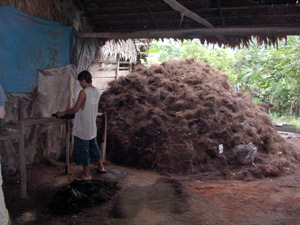|
Traditional knowledge |
|
|
| Local or traditional knowledge of different aspects of the natural environment has in recent decades increasingly attracted the interest of researchers and decision makers promoting sus- tainable use of natural resources. At the basis of this lies the assumption that local knowledge and management systems are sustainable because they have stood the test of time and have evol- ved within a local social and natural context, which they are therefore presumably adapted to. |
|
| Research on local knowledge and re-source management has consequently aimed mainly at documenting local knowledge, practices and institutions, and at testing whether the systems are indeed ecologically, economically and socially sustainable. |
|
|
|
|
 |
|
| Growing concern that local knowledge and management systems as well as the natural systems they deal with are rapidly disappearing has led to a more recent third research focus: Inves-tigating which factors may contribute to the erosion or preservation of know-ledge and management practices. |
|
| Worker cutting fibers for brooms |
|
| The ways in which knowledge and management systems are influenced by changes in natural as well as social and economic systems are decisive for their potential as tools for future natural resource management. |
|
|
|
|
|
|
|
|
